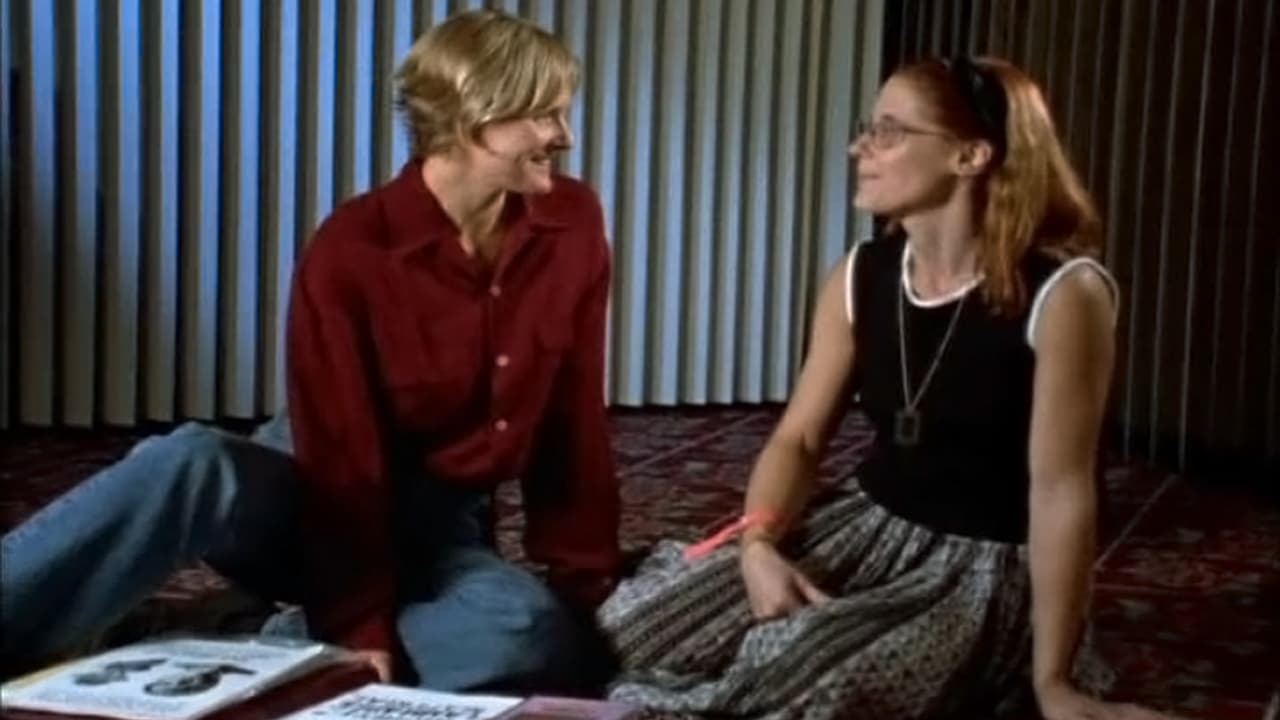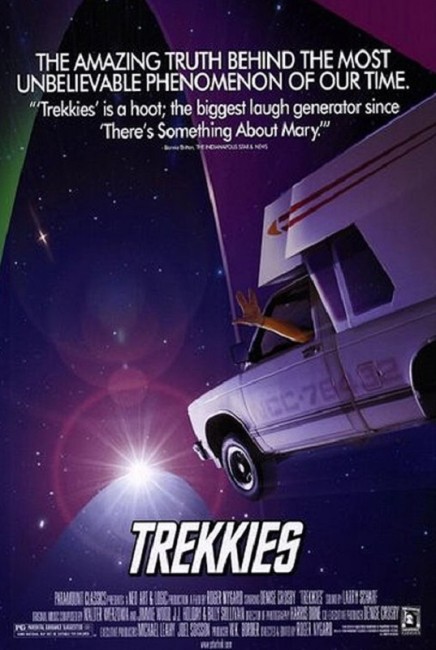USA. 1997.
Crew
Director – Roger Nygard, Producer – W.K. Border, Photography – Harris Done, Additional Photography – Timothy B. Johnson & John Tarver, Music – J.J. Holiday, Billy Sullivan, Walter Werzowa & Jimmie Wood, Visual Effects – Neo Digital Imaging (Supervisor – Jameson Scott Goei). Production Company – Neo Motion Pictures/Paramount Classics.
With
Denise Crosby (Narrator)
Trekkies is a cinematically released documentary that seeks to analyse Star Trek fandom. The documentary is executive produced and narrated by Denise Crosby. Denise Crosby is best known in Trek fandom for playing the character of Tasha Yar in the first season of Star Trek: The Next Generation (1987-94) before she decided she wanted out of her contract and the character was killed off. (Although Crosby failed to obtain the stellar movie roles that she clearly expected to and her subsequent career has only been marked by minor roles and occasional returns to Star Trek every now and again).
The extent of Star Trek fandom is something that one had only guessed at before – the breadth of people it attracts and the amount of product being sold under its name quite astounds. What impresses about Trekkies is the exhaustiveness of the fan phenomenon that it covers – not just the clubs and conventions but also the fan auctions, the model makers and collectibles scene, oddities like the Klingon Language Academy (which is planning to release versions of Hamlet and The Bible translated into Klingon) and even touching bases (briefly) with the normally taboo subject of Star Trek erotica and the field of slash fandom. Given the extraordinary proliferation of the Star Trek cult, a documentary like Trekkies may well have been inevitable, even a surprise that nobody has tapped the subject matter before.
Denise Crosby gets in interviews with most of the original Star Trek cast (although, little is seen of William Shatner and nothing at all of Patrick Stewart) and a good many of the cast members of the modern Star Trek series. Each tells an amusing and often touching anecdote – DeForest Kelley’s story of the woman who send him a joint and a picture of herself in a bikini – “I wanted to turn you on as much as you have me,” and most amusingly Leonard Nimoy on how John Wayne came up behind him and clapped him on the shoulder “You’ve had your ears clipped.” Or else Nichelle Nichols’ story of a young girl who went yelling to her mother, “Mommy, mommy, there’s a Black woman on tv – and she’s not the maid,” which gave the girl the inspiration to succeed for herself – someone better known these days as Whoopi Goldberg. Most touching is James Doohan’s story of how he helped a suicidal woman.
The inevitable downside of Trekkies is that it falls into the stereotyping that occurs whenever media coverage in given to science-fiction fandom – that of playing up the weirdly obsessive elements and letting the cameras make a beeline for the most outlandishly dressed. Trekkies is undeniably guilty of such and wheels out an extraordinary freakshow of those that inhabit fandom – Anne Murphy, the self-labelled ‘Spiner Femme’, who obsessively keeps her photos of Brent Spiner in a locked box in case of a fire and sits on her porch dreaming of Spiner who lives just beyond the hill she does; David and Laurel Greenstein who dress their dog in Starfleet uniform and have Starfleet tiling on their bathroom; the fan who had his ears surgically altered to look like Spock; Dennis Bourgignon and his wife who run a Star Trek-themed dental surgery and wear Starfleet uniform around the house; to the convention organiser who tells the story of a glass of water that had been partially drunken by an ill John de Lancie and was then eagerly bid for by a fan in an auction and drunken so he could spread “the Q virus”; to electronics specialist Richard Kronfeld who drives about town in a motorised replica of the all-encasing body unit that Captain Christopher Pike inhabited in the episode The Menagerie (1966). Much time is given over to Barbara Adams, the fan who caused a media sensation when she insisted on turning up for jury duty for the Clinton Whitewater Trial wearing a Starfleet uniform.

One can slight the media for going for the freakshow aspect of fandom. While fandom may dislike its portrayal as the geek contingent, at the same time it is hard-pressed to offer a clear explanation when people go around conventions and in the street (as seen in the film) dressed in full costume, bid $1500 for a piece of Klingon forehead makeup and clearly seem to be doing everything they can to live inside a fictional series. One suspects that the freakshow element will always be to fandom what drag queens are to gay subculture – the more serious-minded hate the extravagances but invariably have to regard it as a black sheep of the family that everyone has to learn to live with. Trekkies is at least better than previous media representation of fandom in that it never judges the lives of the people portrayed and offers them and others ample time to state the case that what they do is perfectly normal.
Certainly, one has too much respect for people and their desire to pursue hobbies than to laugh at the film outright as some other critics have done – the film’s poster proudly displays a review from The Indianapolis Star and Times that called Trekkies “the best laugh-fest since There’s Something About Mary [1998]” (which is quite insulting when you consider it is people’s hobbies that are being portrayed). You do come away a little concerned for the sanity of some of the people involved. But, if anything, Trekkies could almost be used to make the case for Star Trek fandom being a religion – and there are times the film seems to be in danger of doing so. Many people are given the opportunity to state how Star Trek philosophy gives them meaning and purpose in life, indeed how it has even saved lives. Although it tries not to judge, Trekkies in its own naive way seems to be a fannish film that, amid its having a good laugh at the oddity of some of the people involved, earnestly wants to allow its subjects to make a positive message about good things that can be found inside what they do.
Trekkies 2 (2004) is a sequel. The same period that Trekkies went out also saw two other fictional films dealing with Trek fandom, Free Enterprise (1998) and GalaxyQuest (1999). There have subsequently been several other documentaries about Star Trek fandom with Earthlings: Ugly Bags of Mostly Water (2004), Trek Nation (2011) and Get a Life! (2012).
Director Roger Nygard next broached fiction with the savage and bitingly good Suckers (1999) about used car salesmen. Nygard also produced Six Days in Roswell (1998), a documentary about the cult that surrounds the Roswell UFO crash, The Nature of Existence (2010), which interviews variously people about the Meaning of Life; and The Truth About Marriage (2018).
Trailer here

